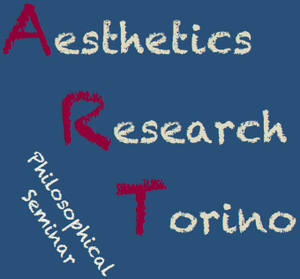Conferenza ART - Francisca Perez-Carreño (Universidad de Murcia)

The next lecture of ART (Aesthetics Research Torino) Philosophical Seminar will be delivered by Prof. FRANCISCA PEREZ CARREÑO on September,16th at 5 p.m.
Location: Aula Guzzo, Via Po 18, Torino
FRANCISCA PEREZ-CARREÑO (Universidad de Murcia): The aesthetic use of imagination in artistic interpretation
In Mimesis as Make-believe, Walton stated: “(s)ome literary works maybe thought of in just this way, as simply mandating the imagining of the propositions their sentences specify. But most of them play a more complex role in make-believe” (Walton 1990, 354). Unfortunately, many contemporary theories of fiction have focussed almost exclusively on the propositional imagining of the asserted content of works. Since imagination is thought to be the adequate epistemic stance to the understanding of fictional works, (fictional) assertions are considered not to be believed, but merely imagined, that is, entertained in the mind without taking them to be true or false. Considering that the propositional content of sentences in fiction is to be merely imagined has two theoretical advantages: first, it fits with a general account of fiction as a kind of imaginative practice. Second, it seems capable to explain the rationality of our affective engagement with fictional characters and events, solving the paradox of fiction. However, accounts of fiction and of affective engagement with fiction are far from complete or ‘attractive’ (Stock 2011, 156) without investigating the “more complex role” that imagination has in the understanding and appreciation of literature.
The aim of my talk is to reconsider the role of imagination in the global understanding of literary works, particularly novels. Unlike contemporary fiction theories, which consider imagination basically from an epistemic perspective – as mental states or propositional attitudes different from belief and perception –, I will endorse Dorsch’ (2012) agential theory of imagining as a mental voluntary direct determining activity. I assume that reading a novel is always an imaginative project (Dorsch 2012), even when all utterances within the narrative are true, and, more to the point, when the illocutive prescription is that of believing, and not merely imagining, make-believing or pretending to believe the represented content.
I will maintain that, given their representational nature, reading non-fiction and fiction novels requires the same kind of imaginings: propositional and iconic imaginings – sensorial, quasi-perceptual and experiential. From reader-response and text theories, it was pointed out that to understand the text demands the imaginative collaboration of the reader filling in the gaps of the text, anticipating events, noticing connections, making temporal inferences, contemplating different global outlines, interpreting metaphors, providing contextual information, etc. The mere understanding of the textual meaning over the meaning of the aggregate of its sentences requires the imaginative activity of the reader. But imagination enters decisively the picture when the novel is read as literature, that is, when sensory, affective and other kinds of experiential imaginings contribute to the pleasure proper of narrative literature. For it is imagination that makes possible the collaboration of mental faculties that is the source of aesthetic pleasure.
Francisca Perez-Carreño is Professor of Aesthetics and Art Theory at the University of Murcia. She is Dean in the Faculty of Philosophy at the University of Murcia and President of the European Society for Aesthetics
She has worked in the philosophy of the visual arts and in contemporary theory of art. She published Los placeres del parecido. Icono y representación (1988) and Arte Minimal. Objeto y sentido (2004). She edited Estética después del fin del arte. Ensayos sobre Arthur Danto (2006), Estética (2013), El valor del arte (2017), Significado, emoción y valor. Ensayos sobre Filosofía de la Música (with M. J. Alcaraz, 2010), and Expression in the Performing Arts, (with I. Álvarez and J. Pérez-López, 2011).
At present, she is the principal investigator of the research project “Aesthetic experience of the arts and the complexity of perception”, funded by the Spanish State Secretariat for Research, Development and Innovation. http://www.um.es/aresmur
ART (Aesthetics Research Torino) is a periodic philosophical seminar organized by the Department of Philosophy and Educational Sciences of the University of Turin and the PhD Program FINO. It is coordinated by Prof. Alessandro Bertinetto.
ART addresses different topics of the contemporary debate in Aesthetics: philosophy of beauty, philosophy of the arts, theory of sensory experience, philosophy of image and imagination, and history of aesthetics.
ART is supported by:
Centro Interuniversitario di Ricerca sulla Morfologia Francesco Moiso (CIM)
Centro di Ricerca Interdipartimentale di Logica, Linguaggio e Cognizione (LLC)
Centro Studi Arti della Modernità
Centro Studi Filosofico-religiosi "Luigi Pareyson"
Laboratorio di Ontologia (Labont)
ART is sponsored by:
Italian Society for Aesthetics (SIE)
European Society for Aesthetics (ESA)




